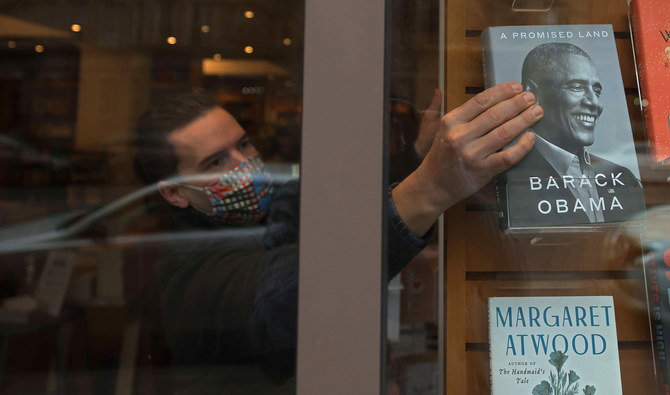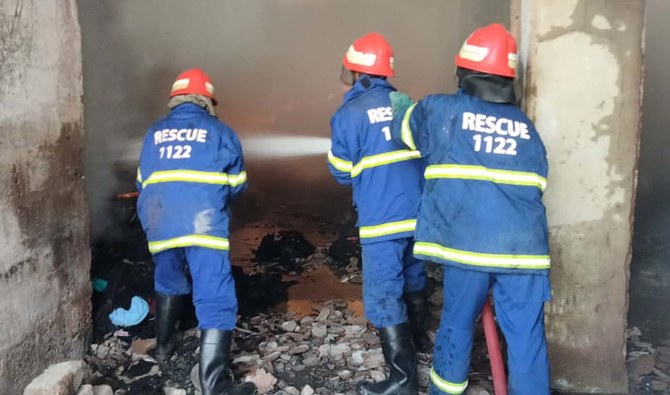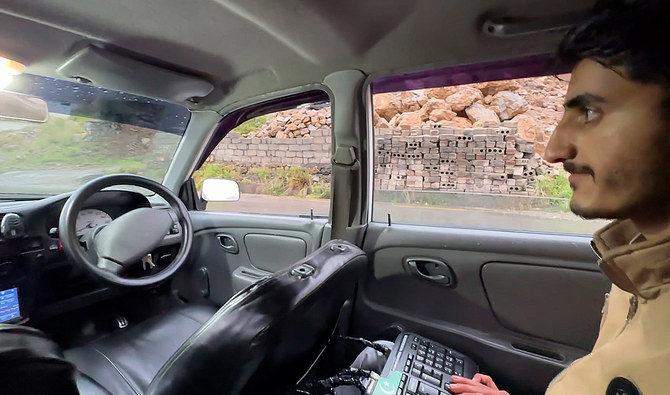ISLAMABAD: The United States decided not to take Pakistan into confidence before launching an attack on Osama bin Laden's compound in Abbottabad in May 2011 since it suspected that "certain elements" in the country had links with militant Islamist factions and were likely to warn the target, former US president Barack Obama recalls in his memoir, A Promised Land, which was launched earlier this week.
"Although Pakistan's government cooperated with us on a host of counterterrorism operations and provided a vital supply path for our forces in Afghanistan, it was an open secret that certain elements inside the country's military, and especially its intelligence services, maintained links to the Taliban and perhaps even al-Qaeda, sometimes using them as strategic assets to ensure that the Afghan government remained weak and unable to align itself with Pakistan's number one rival, India," he writes while providing details of the operation that killed the top al-Qaeda leader.
Obama, who took the Oval Office in January 2009, recalls how some people thought he was going to set the bin Laden issue aside after becoming the president, though he called his close confidantes in May 2009 following a Situation Room meeting and asked them to prepare a viable plan to hunt down the al-Qaeda leader.
"I want to make the hunt for bin Laden a top priority," he told his team. "I want to see a formal plan for how we're going to find him. I want a report on my desk every thirty days describing our progress."
It took a little more than a year for the breakthrough to arrive when Obama’s Central Intelligence Agency Director Leon Panetta announced, only a day ahead of the ninth anniversary of the 9/11 attacks, that the US had the best "potential lead" on the al-Qaeda chief "since Tora Bora."
The US president was told that American spies had traced "a man known as Abu Ahmed al-Kuwaiti, who they believed served as an al-Qaeda courier and had known ties to bin Laden."
"They had been tracking his phone and daily habits, which had led them not to some remote location in the FATA but rather to a large compound in an affluent neighborhood on the outskirts of the Pakistani city of Abbottabad, thirty-five miles north of Islamabad," Obama writes in his memoir, remembering how the size and the structure of the place raised suspicion that the building was used by some high-value militant target.
"The compound itself was unusually spacious and secure, eight times larger than neighboring residences, surrounded by ten- to eighteen-foot walls topped with barbed wire, and with additional walls inside the perimeter. As for the people who lived there, the analysts said they went to great lengths to conceal their identities: They had no landline or internet service, almost never left the compound, and burned their trash instead of putting it outside for collection," Obama says.
"[T]hrough aerial surveillance, our team had been able to observe a tall man who never left the property but regularly walked in circles in a small garden area within the compound's walls. 'We call him the Pacer,' the lead officer said. 'We think he could be bin Laden,'" he adds.
Obama recalls that his vice president Joe Biden was against the idea of launching the raid and thought that the administration "should defer any decision until the intelligence community was more certain that bin Laden was in the compound."
The president also realized that an attack on the compound "would involve violating the territory of a putative ally in the most egregious way possible, short of war — raising both the diplomatic stakes and the operational complexities."
After bin Laden was killed and his body identified, however, Obama anticipated a difficult conversation with Pakistan's president Asif Ali Zardari who, he thought, would face a backlash at home.
"When I reached him, however, he expressed congratulations and support. 'Whatever the fallout,' he said, 'it's very good news.' He showed genuine emotion, recalling how his wife, Benazir Bhutto, had been killed by extremists with reported ties to al-Qaeda."
Zardari also published an article in The Washington Post the next day, calling Pakistan "the world's greatest victim of terrorism" and expressing "satisfaction that the source of the greatest evil of the new millennium has been silenced."
However, the country's top military and intelligence officials had to face pointed questions during a joint session of parliament that was held in camera and amid tight security.
Pakistan deliberately kept out of loop during bin Laden operation, writes Obama
https://arab.news/yd5dw
Pakistan deliberately kept out of loop during bin Laden operation, writes Obama

- In his memoir, the former US president says he anticipated a 'difficult' conversation with his Pakistani counterpart, but Zardari expressed 'congratulations and support'
- Obama recalls he instructed his team to make the hunt for bin Laden a top priority soon after taking the Oval Office in January 2009
Fire erupts at Karachi garment factory, no loss of live reported

- The biggest Pakistani city, known for poor fire safety protocols, witnesses hundreds of such incidents annually
- In November last year, a blaze at a shopping mall in Karachi killed around a dozen people and injured several others
KARACHI: A fire broke out at a garment factory in the southern Pakistani city of Karachi on Saturday, rescue officials said.
The blaze erupted on the ground floor of the garment factory in Zarina Colony in the New Karachi area, according to Rescue 1122 service.
“One fire truck is actively participating in the operation,” a Rescue 1122 spokesperson said, adding that another fire tender has been called to the site.
No loss of life has been reported in the wake of the fire.
Karachi, Pakistan’s largest city and the main commercial hub, is home to hundreds of thousands of industrial units and some of the tallest buildings in the South Asian country.
The megapolis, known for its fragile firefighting system and poor safety controls, witnesses hundreds of such incidents annually.
In Nov., a blaze at a shopping mall killed around a dozen people and injured several others. In April last year, four firefighters died and nearly a dozen others were injured after a fire broke out at a garment factory, while 10 people were killed in a massive fire at a chemical factory in the city in August 2021.
In the deadliest such incident, 260 people were killed in 2012 after being trapped inside a garment factory when a fire broke out.
Saleem Haider Khan, Faisal Kundi named governors of Pakistan’s Punjab, Khyber Pakhtunkhwa provinces

- Nominations come as part of power-sharing deal between PM Sharif’s party and ex-FM Bhutto-Zardari-led faction
- According to the deal, the PPP backed Sharif for the prime minister’s office in return for constitutional positions
ISLAMABAD: The Pakistan Peoples Party (PPP), a coalition partner in Prime Minister Shehbaz Sharif’s government, has nominated Saleem Haider Khan and Faisal Karim Kundi as governors of Pakistan’s eastern Punjab and northwestern Khyber Pakhtunkhwa provinces, the PPP chairman announced on Friday.
The PPP forged an alliance with PM Sharif’s Pakistan Muslim League-Nawaz (PML-N) party after Pakistan’s national election on February 8 failed to present a clear winner.
According to the power-sharing deal, the PPP backed Sharif for the prime minister’s office in return for the presidency, chairman of Senate and other important constitutional positions.
In a post on X, PPP Chairman Bilawal Bhutto-Zardari congratulated Khan and Kundi, and extended his good wishes to them
“I am confident they [Khan and Kundi] will perform their duties with the dignity their new office demands,” he said on X.
In Pakistan, a governor is a representative of the state to a province, who is appointed by the president on the advice of the prime minister.
Such positions may seem ceremonial and symbolic, but they do hold significant constitutional importance.
At present, PML-N’s Balighur Rehman has been serving as the Punjab governor, while JUI-F’s Hajji Ghulam Ali holds the post in KP.
Bhutto-Zardari also called on PM Sharif in Islamabad, following the nominations, Pakistani state media reported.
“During the meeting, views were exchanged on overall political situation in the country and matters of national interest,” the Radio Pakistan broadcaster said.
Pakistan Cricket Board confirms details of national side’s South Africa tour

- The side will depart for Durban on December 2 after returning from Australia in Nov.
- The ODIs will be played from December 17-22 in Paarl, Cape Town, and Johannesburg
ISLAMABAD: The Pakistan Cricket Board (PCB) on Friday announced details of the Pakistan men’s cricket team’s tour of South Africa for three Twenty20, three one-day international and two Test matches in the second half of 2024.
Durban, Centurion, and Johannesburg will host the T20Is from December 10-14, according to the PCB. The ODIs will be played from December 17-22 in Paarl, Cape Town, and Johannesburg, while the two ICC World Test Championship 2023-25 matches will be held at Centurion (December 26-30) and Cape Town (January 3-7).
The side will depart for Durban on December 2 after returning from Australia on November 19, having featured in a series of three ODIs and three T20Is from November 4-18. After completing their African safari on January 8, Pakistan will take on New Zealand and South Africa in a three-nation ODI tournament on home turf, which will be followed by the eight-team ICC Champions Trophy 2025 in Pakistan.
“Prior to the tours of Australia and South Africa, Pakistan will host Bangladesh and England for two and three Tests, respectively,” the PCB said in a statement. “This means they will play seven Tests, minimum of 10 ODIs, and six T20Is in the six-month period from August 2024 to January 2025.”
This will be Pakistan’s seventh Test tour of South Africa since 1994-95. Their two Test wins were in the 1997-98 and 2006-2007 series.
In the Durban Test in 1997-98, Pakistan won by 29 runs at the back of centuries from Azhar Mahmood (132) and Saeed Anwar (118), match figures of nine for 149 by Mushtaq Ahmed and a first innings five-fer by Shoaib Akhtar. In the 2006-2007 Port Elizabeth Test, Pakistan won by five wickets with Inzamam-ul-Haq being named as Player of the Match for his 92 in the first innings.
In ODIs, Pakistan has won two of the last three series in 2013-2014 and 2020-21, while South Africa triumphed in 2002-2003 (4-1), 2006-2007 (3-1), 2012-2013 (3-2), and 2018-2019 (3-2).
In 12 T20Is to date, Pakistan leads 6-5 in head-to-head encounters, with one match ending in no-result.
Tour schedule:
10 Dec – 1st T20I, Durban
13 Dec – 2nd T20I, Centurion
14 Dec – 3rd T20I, Johannesburg
17 Dec – 1st ODI, Paarl
19 Dec – 2nd ODI, Cape Town
22 Dec – 3rd ODI, Johannesburg
26-30 Dec – 1st Test, Centurion
3-7 Jan – 2nd Test, Cape Town
Young Pakistani innovator dreams big with ‘self-driving’ car innovation

- Ehsan Zafar Abbasi belongs to a remote village in Abbottabad where he is known for his passion for science
- The 20-year-old drives his family car using computer keyboard, wants to set up automobile company like Tesla
ABBOTTABAD: Under the harsh glow of a fluorescent light, 20-year-old Ehsan Zafar Abbasi is busy examining the components of an obsolete printer he has just dismantled. A pre-engineering student from the remote village of Bagh in Pakistan’s Abbottabad district, he is known for his passion for taking electronics apart, often leading to innovative but sometimes unsuccessful repairs.
Abbasi recently captured the attention of his neighborhood by configuring his family car to mimic a self-driven vehicle. With the driver’s seat empty and the headrest removed, onlookers were captivated by the sight of an automobile that seemed to be driving itself.
Speaking to Arab News earlier this week, the young student said he first thought of driving a car through a keyboard while playing video games as a child.

“At that time, power supply was hardly ever available,” he recalled. “So, whenever we got electricity, it was another kind of happiness. We would immediately sit in front of the computer and play those games on CDs such as GTA: Vice City or Need for Speed.”
“So, I was inspired after playing those games, realizing if a car could be driven through a keyboard in a game, it could also be driven like that in real life,” he continued.
With limited Internet accessibility in his village, Abbasi understood the workings of electronics and mechanical items by conducting his own experiments in a tiny room under the stairs in his house.
“I have built a lab where I perform my experiments,” he said. “My brothers and uncles support my ambitions. They bring me scrap electronics from the second-hand market. I have dismantled many mobile phones, tablets, printers, scanners, computers, projectors, juicer machines and other things.”

After spending over seven months perfecting his new project, Abbasi said he wanted to further refine the car by adding more features to it.
“I want to add sensors and modern technology to the car so that people with disabilities can also fulfill their wish [to drive] and become independent,” he added.
However, the keyboard-driven vehicle is not his only invention.
“A year ago, I made another device for cars in which cellphone technology was integrated,” he said. “It had a SIM. If someone decided to steal your car, you could simply make a call on the [installed] device and your car stopped working.”
The vehicle’s brakes, he explained, could be activated by using one’s cellphone. Not only that, but the installed device also relayed any conversation among the carjackers in real-time.
Asked about his future ambitions, Abbasi said he wanted to build a multinational automotive company like Tesla in Pakistan. He also shared his desire to go to a top-notch university abroad like the Massachusetts Institute of Technology in the United States.
“Obviously, I cannot afford it, nor do I possess adequate English-language skills,” he continued. “I studied in ill-equipped public schools where we did not have electricity, Internet and other modern facilities. We used to walk for two hours to go to school and two hours on our way back.”
By the time he reached home, he felt tired and usually discovered that there was no electricity.
“I could not study the way I wanted to,” he said with a deep yearning in his eyes. “I request the Pakistani government, our prime minister and the president, to support me in getting quality higher education so I can add to the prestige of my country.”
England Women’s cricket coach using AI to pick team ahead of series with Pakistan

- Jon Lewis says technology worked in multi-format Women’s Ashes series against arch-rivals Australia
- Pakistan Women’s National Cricket Team will play Twenty20 and ODI series in England later this month
LONDON: England Women’s cricket coach Jon Lewis revealed Friday he is using artificial intelligence to aid team selection, saying the technology helped his side square last season’s Ashes.
Lewis first became familiar with the work of London-based PSi when he took charge of the UP Warriorz franchise in India’s Women’s Premier League.
Now the 48-year-old former England paceman uses the company to assist with his decisions about squad composition, team balance and in-game match-ups between players.
The system plots projected outcomes depending on the composition of each side.
“I can send multiple different line-ups to the PSi in London and they run, I think, about 250,000 simulations per team that I send, with all different permutations that could happen through the game,” he said.
We are able to run simulated teams versus the simulated opposition to give us an idea about how those teams may match up against each other.
“I came across it during my time at UP Warriorz and it’s something I looked at and thought it could add some value to the England Women’s cricket team.”
Lewis said he still favored a “people-first approach” but he added: “What data can do is give you a really objective view of what could happen and what has happened previously. I think it will help with borderline decisions in terms of selection and match-ups.”
Lewis, who has spoken to England’s rugby union coach Steve Borthwick about his own use of the PSi model, said the system had proved its worth as his side drew last season’s multi-format Women’s Ashes series against arch-rivals Australia.
“There was one selection particularly last year, one period of the Ashes that we targeted as a team,” said Lewis, speaking at the announcement of England’s squad for T20 and ODI series at home to Pakistan later this month.
“There were a couple of selections where AI really helped because both players I was thinking about picking were both in really good form and were both really selectable and it did help with those selections.
“We saw a real strength in Australia and we matched up our strength to that. That worked really, really well and it helped us win the T20 series in particular, which got us back in the Ashes.”
AI is becoming an increasing feature of top-level sport, with International Olympic Committee president Thomas Bach saying last month it could help identify talented athletes “in every corner of the world.”
He said AI could also provide more athletes with access to personalized training methods.










